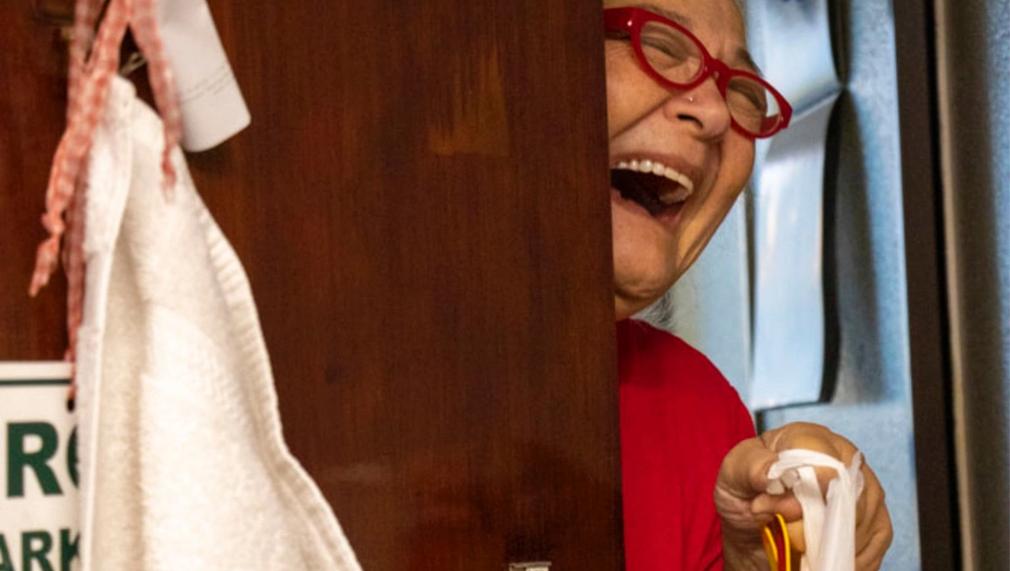Telephone Reassurance Program For Homebound Seniors
Through Meals On Wheels of Long Beach’s Telephone Reassurance Program homebound seniors and disabled community members receive social phone calls from staff and volunteers. The calls provide someone to talk to, someone to listen, someone who cares, and someone who can help with difficulties or provide linkage to resources. Our callers restore the friendly and compassionate conversations critical to the mental health of our homebound neighbors when they have on one else to turn to.

What is the primary issue area that your application will impact?
Social support networks
In what stage of innovation is this project, program, or initiative?
Expand existing project, program, or initiative (expanding and continuing ongoing, successful work)
What is your understanding of the issue that you are seeking to address?
Meals On Wheels Of Long Beach (MOWLB) has not missed a delivery day since its launch in 1971. During these decades of delivering fresh, healthy meals to homebound senior and disabled Long Beach residents, we have seen first-hand the level of social isolation faced by our clients. Homebound clients are unable to shop for or prepare their own healthy meals. This state of mobility creates social isolation that is compounded by the losses of friends and family as they age. Of the approximately 800 clients served annually and 300 or more served daily (not all clients need year-round services), more than 50% share the Friendly Visitor who delivers their meals is their only regular visitor, and these visits are necessarily brief. As social isolation is linked to many health issues, and especially for the elderly is associated with an approximate 50% increased risk of dementia (https://doi.org/10.17226/25663, increasing social connection promotes seniors’ ability to age safely at home.
Describe the project, program, or initiative this grant will support to address the issue.
MOWLB’S new Telephone Reassurance Program was launched in October 2023 with an initial enrollment of 20 clients. It has steading grown to 63 clients and enrollment is ongoing. As noted above, providing social contact is particularly critical for the elderly as their friends and family pass away. In fact, the oldest program participant is 98 years old, and the loss of loved ones is a frequent topic of conversation. Enrolled clients receive pre-scheduled phone calls during which they can talk about any topic and for as long as they wish. Some want to speak every day, and some want to talk for more than an hour, but the average call is less than one hour long, and most clients want to talk twice per week. The callers provide pleasant conversation, and most importantly, they listen. Over time, friendly relationships are developed, and trust is built. As clients become more comfortable, they share more and benefit more from the social contact and growing intimacy. Often, MOWLB volunteers and staff learn of needs that are not met and are able to include the client in our Client Support Program, which provides additional services, such as help with medical appointments, paying bills, etc. We also provide basic need items revealed to be struggles, with key needs of hygiene items, pet food, and transportation, for example to in-person social events at senior centers. At times, bonds develop and are maintained outside of MOWLB, thus furthering lasting intergenerational friendships.
Describe how Los Angeles County will be different if your work is successful.
A MOWLB client can call the office speak immediately with a staff member or volunteer who can enroll them to receive social support calls beginning as early as the following day if needed. Each client in need will receive a landline telephone with an easy to read caller ID to make it possible to distinguish MOWLB calls. The great majority rely on their landlines and even when expecting our call, the answer rate fluctuates due to the volume of spam calls received. Clients will find their callers to be pleasant and engaging conversationalists and considerate and patient listeners. The program implementation will be standardized and documented for easy scaling, evaluation and improvements within MOWLB, and so that its design can be easily shared with other nonprofits. MOWLB will hire 2 part time staff to provide a reliable 8 hours of call time daily and to reduce reliance on volunteers while increasing services to an estimated 100 clients during the grant period.
What evidence do you have that this project, program, or initiative is or will be successful, and how will you define and measure success?
Program evaluation is in development. Success will be measured by the numbers served, the capacity to enroll clients, and the participants’ outcomes. This request proposes an expansion to serve 100 clients by the end of the grant period. Two client stories already show this program’s importance. One client revealed that he was a hoarder and too embarrassed to let in a plumber for necessary work in his Section 8 apartment. He was facing eviction in three days but several calls with Ms. Rios (Program Manager) reduced his feelings of shame enough for him to allow the work and remain housed. Another client shared suicidal feelings. The volunteer successfully soothed him during a 15 minute call, Ms. Rios immediately alerted another nonprofit serving the client and she arrived at his apartment within 20 minutes of the start of the call, by which time the client was calm and reaching out to a friend. MOWLB is developing a protocol in case of other clients expressing suicidal thoughts intent.
Approximately how many people will be impacted by this project, program, or initiative?
Direct Impact: 100.0
Indirect Impact: 100.0